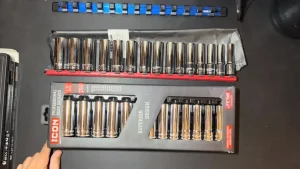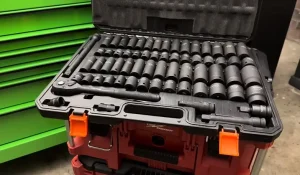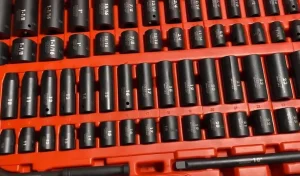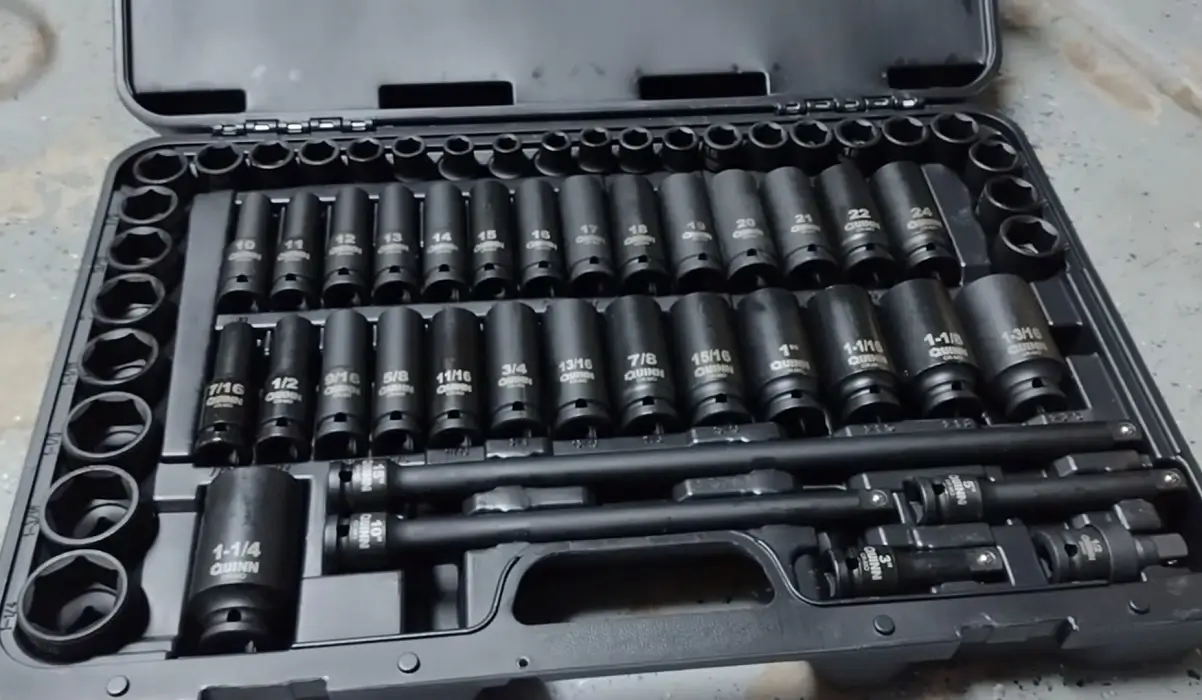Deep socket sets are a must-have tool for any DIY enthusiast, mechanic, or handyman. If you’re working on automotive repairs, household projects, or machinery maintenance, deep socket sets provide the necessary reach and versatility to tackle those hard-to-reach fasteners.
I’ll explore the features, benefits, and applications of deep socket sets, helping you understand why they are an essential addition to your toolbox. Let’s dive in and discover how deep socket sets can make your repair and maintenance tasks much easier and more efficient.
What is a Deep Socket Set?
A deep socket set is a collection of sockets that are specifically designed with a greater depth than standard sockets. The “depth” refers to the internal space within the socket that allows it to accommodate longer fasteners or reach recessed areas where regular sockets cannot reach.
Deep socket sets typically come in various socket sizes, and drive sizes, and may include additional accessories such as extension bars, ratchets, or breaker bars. These sets are often made from durable materials like chrome vanadium steel to withstand high torque applications.

Top 5 Brand of Deep Socket Set
While many reputable brands manufacture deep socket sets, it’s important to note that brand preferences can vary based on individual experiences and specific needs. However, here are five well-regarded brands known for producing high-quality deep socket sets:
Craftsman: Craftsman is a well-established brand known for its durable and reliable tools. They offer a range of deep socket sets with various socket sizes and drive sizes, designed to meet the needs of both professionals and DIYers.
Snap-on: Snap-on is renowned for its professional-grade tools, and their deep socket sets are no exception. Snap-on sockets are known for their precision, durability, and excellent grip, making them a popular choice among mechanics and professionals in the automotive industry.
GearWrench: GearWrench specializes in producing innovative and high-performance hand tools. Their deep socket sets are known for their durability, ease of use, and affordability. GearWrench offers a wide range of socket sizes and drive sizes, catering to different applications.
Sunex Tools: Sunex Tools manufactures a variety of automotive and industrial tools, including deep socket sets. They offer a selection of deep socket sets with different drive sizes and socket sizes. Sunex Tools is known for producing reliable and long-lasting tools at competitive prices.
Matco Tools: Matco Tools is another reputable brand that produces professional-grade tools, including deep socket sets. Matco’s deep socket sets are known for their quality construction, precision, and durability. They offer a range of options to suit different needs and applications.
Number of Pieces
Here are some common options for the number of pieces in a deep socket set:
Small Sets: Entry-level or compact deep socket sets usually contain around 8 to 12 pieces. These sets often include the most commonly used socket sizes and drive sizes, providing a basic selection for general DIY tasks or occasional use.
Medium Sets: Mid-range deep socket sets typically range from 20 to 40 pieces. These sets offer a more extensive variety of socket sizes, drive sizes, and accessories such as extension bars or ratchets. They are suitable for intermediate-level DIY projects or professional use in specific industries.
Large Sets: High-end or professional-grade deep socket sets can consist of 50 pieces or more. These comprehensive sets often include a wide range of socket sizes, drive sizes, and additional accessories to cover a broad spectrum of applications. They are commonly used by mechanics, technicians, or professionals who require versatility and a complete set of deep sockets.
It’s worth mentioning that other brands such as Stanley, Kobalt, Husky, and Tekton also produce deep socket sets that are well-regarded by users. When you’re selecting a deep socket set, it’s important to consider factors such as your specific requirements, budget, and the type of work you’ll be performing to choose the brand and set that best meets your needs.

Deep Socket Set Construction Materials
Deep socket sets are typically made from high-quality materials chosen for their strength, durability, and resistance to wear. The most common material used for deep sockets is chrome vanadium steel (Cr-V). However, other materials may also be used depending on the specific requirements and price range of the socket set. Here are some common materials used in the construction of deep socket sets:
Chrome Vanadium Steel (Cr-V): Chrome vanadium steel is a popular choice for deep socket sets due to its excellent strength, toughness, and wear resistance. It is known for its ability to withstand high torque applications without bending or fracturing. Cr-V sockets often have a polished chrome finish to enhance their corrosion resistance and make them easier to clean.
Chrome Molybdenum Steel (Cr-Mo): Chrome-molybdenum steel is a strong and durable alloy that provides enhanced hardness and toughness. Cr-Mo sockets are commonly used in heavy-duty applications and are particularly suitable for impact wrenches due to their ability to withstand high levels of impact force.
Stainless Steel: While less common, stainless steel is occasionally used for certain specialized deep socket sets. Stainless steel offers excellent corrosion resistance, making it suitable for applications where exposure to moisture or chemicals is a concern.
Aluminum: In some cases, deep socket sets may include sockets made from aluminum. Aluminum sockets are lightweight and non-magnetic, making them suitable for specific tasks where weight reduction or non-magnetic properties are desired. However, aluminum sockets are generally not as durable as steel sockets and may be more prone to deformation.
The choice of material may vary depending on the intended use and price range of the deep socket set. Higher-end professional-grade sets often use premium materials like chrome vanadium steel or chrome molybdenum steel for superior strength and durability, while more affordable sets may utilize alternative materials.
You should select a deep socket set, and consider the material used along with other factors such as the intended application, frequency of use, and budget to ensure you choose a set that meets your specific requirements.
Purpose and Benefits of Deep Socket Set
The purpose of deep socket sets is to provide the necessary tools for accessing and working with fasteners that are located in recessed or hard-to-reach areas. Here are some specific purposes and benefits of deep socket sets:
Accessing Recessed Fasteners: Deep socket sets are designed with a greater depth, allowing them to reach bolts, nuts, or other fasteners that are recessed within components. This is especially useful in automotive repairs, machinery maintenance, and construction projects where access to such fasteners is crucial.
Preventing Slippage and Damage: The increased depth of deep sockets ensures a secure fit around the entire length of longer fasteners. This reduces the risk of slippage and minimizes the chances of rounding off the fastener’s corners, thereby preventing damage to both the fastener and the socket itself.
Versatile Applications: Deep socket sets find application in a wide range of industries and tasks. From automotive repairs, plumbing, and electrical work to machinery maintenance and general DIY projects, deep sockets provide the flexibility to work with various fasteners and in different settings.
Enhanced Torque Application: Deep socket sets allow for the application of greater torque due to their extended depth. This can be particularly advantageous when dealing with stubborn or tightly fastened bolts or nuts that require more force to loosen or tighten.
Increased Reach: The longer reach provided by deep socket sets enables access to fasteners located in confined or hard-to-reach areas. This eliminates the need for disassembling surrounding components or using alternative tools, saving time and effort in the process.
Compatibility with Standard Sockets: Deep socket sets are often compatible with standard sockets of the same drive size. This allows for seamless integration with existing socket sets, providing a comprehensive solution for a wide range of fastening needs.
The purpose of deep socket sets is to make fastener access and manipulation easier, more efficient, and safer.

Real-World Applications of Deep Socket Sets
Deep socket sets have a wide range of real-world applications across various industries and tasks. Here are some common applications:
Automotive Repair: Deep socket sets are extensively used in automotive repair and maintenance tasks. They are used to loosen and tighten bolts, nuts, and other fasteners in hard-to-reach areas, such as engine compartments, suspension systems, and brake assemblies.
Construction and Building: Deep socket sets find applications in construction and building projects. They are used by carpenters, plumbers, electricians, and other tradespeople for tasks like installing and securing structural components, tightening bolts on machinery, and assembling or disassembling equipment.
Machinery and Equipment Maintenance: Deep socket sets are essential for maintaining and repairing machinery and equipment in industrial settings. They are used to access fasteners in confined spaces on machines, engines, conveyors, and other equipment.
Home DIY Projects: Deep socket sets are handy for various do-it-yourself (DIY) projects around the house, such as furniture assembly, plumbing repairs, appliance maintenance, and general repairs. They are particularly useful when working with recessed or hard-to-reach fasteners.
Aerospace and Aviation: Deep socket sets are used in aerospace and aviation industries for tasks involving aircraft maintenance, repair, and assembly. They are employed to access and work on fasteners located in tight spaces within aircraft engines, landing gear, and other components.
Marine and Boating: Deep socket sets are utilized in marine and boating applications for tasks like engine repairs, rigging assembly, and general maintenance. They are used to access and tighten fasteners in cramped spaces on boats, yachts, and other watercraft.
Industrial Maintenance: In industrial settings, deep socket sets are used for routine maintenance and repair of machinery, production lines, and heavy equipment. They are invaluable for accessing and working on fasteners in hard-to-reach areas.
HVAC (Heating, Ventilation, and Air Conditioning): Deep socket sets are employed in the HVAC industry for tasks such as installing or replacing HVAC units, securing ductwork, and maintaining heating and cooling systems.
Agricultural Equipment: Deep socket sets are utilized in the agricultural sector for maintaining and repairing farm machinery and equipment. They are used to access fasteners on tractors, harvesters, irrigation systems, and other agricultural machinery.
Their versatility, ability to access confined spaces and compatibility with various drive sizes make them essential tools across a wide range of industries and tasks.
How to Choose The Right Deep Socket Set
Choosing the right deep socket set requires considering several factors to ensure that it meets your specific needs. Here are some factors to consider when selecting a deep socket set:
Socket Size: Consider the range of socket sizes you’ll need for your projects. Deep socket sets typically come in a variety of sizes, such as 1/4-inch, 3/8-inch, and 1/2-inch drives. Make sure the set you choose includes the sizes that match your requirements.
Metric or SAE: Determine whether you primarily work with metric or SAE (Society of Automotive Engineers) measurements. Purchase a deep socket set that corresponds to the measurement system you use most frequently to avoid compatibility issues.
Material and Quality: Look for deep socket sets made from high-quality materials such as chrome vanadium steel or chrome-molybdenum steel. These materials offer durability and resistance to corrosion. Quality sockets will generally have a mark or indication of their material composition.
Drive Size: Consider the drive size of the ratchet or wrench you plan to use with the sockets. The most common drive sizes are 1/4-inch, 3/8-inch, and 1/2-inch. Ensure that the deep sockets you choose are compatible with the drive size of your ratchet or wrench.
Depth and Length: Evaluate the depth and length of the sockets based on your specific needs. Deep sockets are designed to reach fasteners in tight or recessed areas. Consider the depth of the sockets to ensure they will accommodate the required bolt or nut length.
Set Contents: Review the contents of the socket set. Determine if the set includes the socket sizes you commonly use. Some sets may also include additional accessories like extensions, universal joints, or spark plug sockets. Assess whether these extra components align with your requirements.
Brand and Warranty: Consider reputable brands known for producing high-quality tools. Established brands often provide warranties that can offer peace of mind regarding the durability and performance of the deep socket set.
Budget: Determine your budget for the deep socket set. While it’s important to invest in quality tools, consider your specific needs and how frequently you’ll be using the sockets to find a set that aligns with your budget.
Reviews and Recommendations: Read customer reviews and seek recommendations from professionals or enthusiasts in the field. Their experiences can provide insights into the quality and performance of different deep socket sets.
You’ll be better equipped to choose a deep socket set that meets your requirements and provides reliable performance for your projects.
Proper Care and Maintenance of Deep Sockets
Here are some tips to help you care for and maintain your deep sockets:
Keep Them Clean: Regularly clean your deep sockets to remove dirt, debris, and any residual substances. Use a soft brush or compressed air to remove loose particles. Avoid using solvents or harsh cleaning agents that could damage the sockets.
Lubrication: Apply a thin layer of lubricant, such as a light machine oil, to the inside of the sockets periodically. This helps reduce friction and prevents rust or corrosion. Be sure to wipe off any excess oil to avoid attracting dirt and debris.
Store Properly: Store your deep sockets in a clean and dry toolbox or case to protect them from moisture, dust, and other contaminants. Consider using socket organizers or trays that keep the sockets organized, and easily accessible, and prevent them from rolling around.
Avoid Overloading: Deep sockets are designed to handle specific torque levels. Avoid using extension bars or other adapters that may increase the torque beyond the socket’s intended capacity. Overloading can lead to socket deformation or breakage.
Avoid Impact or Misuse: Deep sockets are not designed to be used with impact tools unless explicitly specified. Using a socket not designed for impact use with an impact wrench can cause damage or injury. Always use the appropriate type of socket for the task at hand.
Inspect for Damage: Regularly inspect your deep sockets for signs of wear, cracks, or other damage. If you notice any issues, such as a loose or damaged socket, replace it immediately to prevent further problems.
Avoid Excessive Force: Use the correct size socket for the fastener you’re working with. Avoid using excessive force or using a socket that does not fit properly, as it can lead to rounding off the fastener or damaging the socket.
Avoid Excessive Heat: Deep sockets can be sensitive to heat. Avoid exposing them to excessive heat sources, such as open flames or direct sunlight, as it can affect their hardness and durability.
Follow Manufacturer’s Recommendations: Always follow the manufacturer’s recommendations and guidelines for the care and maintenance of your specific deep socket set. They may provide specific instructions based on the materials and construction of the sockets.
With these care and maintenance tips, you can extend the life of your deep sockets and ensure their reliable performance for a long time.
Frequently Asked Questions about Deep Socket Sets
What is a Deep Socket Set Used For?
A deep socket set is used to tighten or loosen bolts, nuts, and other fasteners in hard-to-reach or recessed areas.
Which is Better Shallow or Deep Sockets?
It depends on the specific application. Shallow sockets are generally more versatile and can be used in a wider range of situations. Deep sockets, on the other hand, are specifically designed for accessing and working with fasteners in deep or recessed areas.
What is a 6 Point Deep Socket?
A 6-point deep socket is a type of socket with six internal contact points or “points of contact” that engage with the corresponding sides of a fastener. It is designed to provide a more secure grip on the fastener compared to a 12-point socket, which has twelve contact points. The 6-point design reduces the risk of rounding off the fastener corners and is often preferred for heavy-duty applications where higher torque is required.
Do You Need Deep Sockets for Lug Nuts?
No, deep sockets are not necessary for lug nuts. Shallow sockets are typically sufficient for most lug nut applications.
Should I Use 12-Point or 6 Point Socket for Lug Nuts?
It is generally recommended to use a 6-point socket for lug nuts.
What Size Socket Fits Most Lug Nuts?
Most lug nuts require a socket size of 19mm or 3/4 inches.
Conclusion
In the world of tools, a deep socket set is a versatile and must-have addition to any toolbox. These specialized sockets are designed to reach and work with fasteners in tight or recessed areas, making them invaluable for various tasks. I have explored the features, applications, and maintenance tips for deep socket sets. The standout feature of a deep socket set is its ability to access and work with fasteners in confined spaces.

